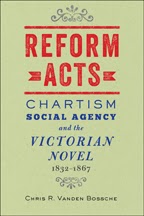Vanden Bossche argues that Victorian novels sought to imagine new forms of social agency evolving from Chartism, the dominant working-class movement of the time. Novelists envisioned alternative forms of social agency by employing contemporary discourses from Chartism's focus on suffrage as well as the means through which it sought to obtain it, such as moral versus physical force, land reform, and the cooperative movement.
Each of the three parts of Reform Acts begins with a chapter that analyzes contemporary conversations and debates about social agency in the press and in political debate. Succeeding chapters examine how novels envision ways of effecting social change, for example, class alliance in Barnaby Rudge; landed estates as well as finely graded hierarchy and politicians inConingsby and Sybil; and reforming trade unionism in Mary Barton andNorth and South. By including novels written from a range of political perspectives, Vanden Bossche discovers patterns in Victorian thinking that are easily recognized in today's assumptions about social hierarchy.
